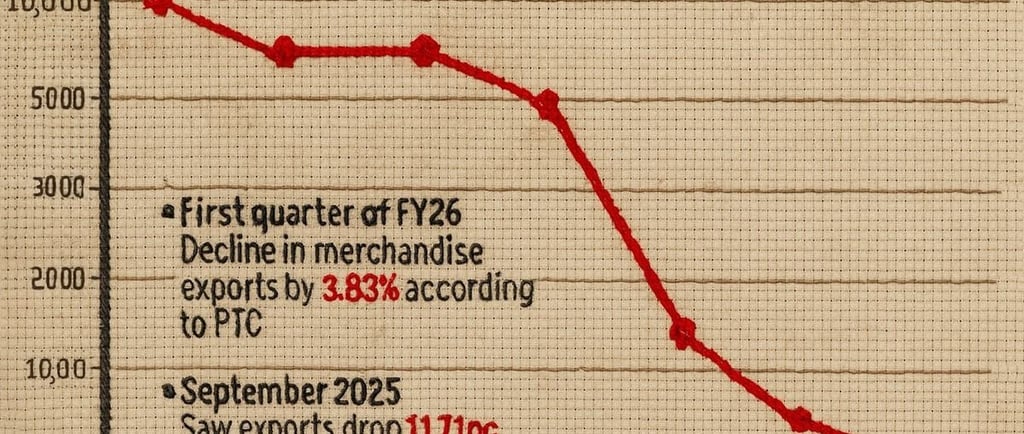GLOBISCOPES
Pakistan’s Textile Sector Faces Major Export Crisis Amid Rising Costs and Policy Shifts
KARACHI: Pakistan’s largest export industry — the textile sector — is on the brink of a severe downturn, as leading industry bodies warn of a sharp fall in exports, widespread factory closures, and surging production costs that threaten the country’s fragile economic stability. According to the Pakistan Textile Council (PTC), textile exports dropped by almost 12% year-on-year in September, bringing total export earnings for the first quarter of FY26 down 3.83% to $7.61 billion. Meanwhile, a growing trade deficit and higher import bill have further strained Pakistan’s external accounts. Industry Sounds Alarm Over Policy Missteps Prominent industry figures — including PTC Chairman Fawad Anwar, former Karachi Chamber of Commerce and Industry (KCCI) president Javed Bilwani, and industrialist Zubair Motiwala — have raised serious concerns over the government’s economic management. They warned that unless urgent reforms are introduced in energy pricing, taxation, and export facilitation schemes, Pakistan risks losing its export competitiveness to regional rivals such as Bangladesh, India, and Vietnam. The withdrawal of the Export Facilitation Scheme (EFS) and record-high energy tariffs were cited as major blows to the struggling textile industry, already burdened by poor infrastructure and inconsistent policies. Exports Continue to Shrink In its latest report, the Pakistan Bureau of Statistics (PBS) confirmed that overall merchandise exports fell 3.83% year-on-year during July–September FY26, slipping to $7.61 billion from $7.91 billion last year. September’s exports alone plunged 11.71% to $2.51 billion, marking the fifth contraction in six months — a worrying trend for an economy that heavily depends on textile earnings. Meanwhile, Pakistan’s trade deficit widened to $9.37 billion in the first quarter, compared to $7.05 billion during the same period last year. Imports surged 13.49%, increasing pressure on foreign reserves and the exchange rate. Rising Costs Force Factory Closures The financial strain has triggered a wave of shutdowns across the textile sector. Among them, Gul Ahmed Textile Mills Limited recently announced the closure of its export apparel division, citing unbearable input costs, erratic taxation policies, and growing competition from regional exporters. The apparel segment is one of the country’s most labour-intensive industries, and its closure signals the extent of the economic stress gripping the manufacturing base. Speaking to The Express Tribune, Javed Bilwani warned that “many more textile units across Pakistan are on the verge of closure as industries continue to operate at a loss.” He criticised the government for excluding major stakeholders from policymaking discussions, despite KCCI’s contribution of over 54% to Pakistan’s total exports and 66% of the national tax base. “Our cost of production is higher than in the US and Europe — our main export destinations,” Bilwani said. “If energy and input costs here exceed those abroad, how can Pakistani exports compete?” He added that the termination of the EFS has worsened the crisis, suggesting that the government should have fixed loopholes rather than abolishing the scheme altogether. Business Leaders Call for Urgent Reforms Echoing these concerns, Zubair Motiwala said Pakistan’s export collapse is directly linked to the end of the facilitation scheme. “The only sustainable way forward is to restore the EFS,” he stressed. “If there were legal or procedural flaws, they should have been addressed, not scrapped.” He added that the closure of Gul Ahmed’s apparel division was a direct outcome of rising operational costs and lack of export incentives. The textile industry’s crisis mirrors a broader economic challenge — in recent months, global companies including Procter & Gamble, Shell, Microsoft, Total Energies, Pfizer, Sanofi, and Careem have either exited Pakistan or drastically scaled down operations. PTC’s Four-Point Rescue Plan The Pakistan Textile Council has repeatedly urged the government to implement immediate measures to restore export competitiveness: 1. Regionally competitive and stable energy pricing (for RLNG and electricity). 2. Comprehensive tax reforms, including automated 72-hour refunds and zero-rating inputs under EFS. 3. Improved financing access, through a stronger EXIM Bank and expanded Export Finance and Long-Term Financing Facilities (LTFF). 4. Transparent policy stability, with monthly key performance indicators (KPIs) to track results. “If timely action is not taken,” warned PTC Chairman Fawad Anwar, “Pakistan could face more factory closures, job losses, and a sharp drop in foreign exchange earnings — at a time when the country can least afford it.”
BUSINESS
Globiscope
10/5/20251 min read


My post content
Globiscopes news 2025
Globiscopes news empowers the generation of tomorrow for a brighter future and hope for every individual.
inbox
Subscribe to our newsletter and never miss a story.
We care about your data in our privacy policy.
